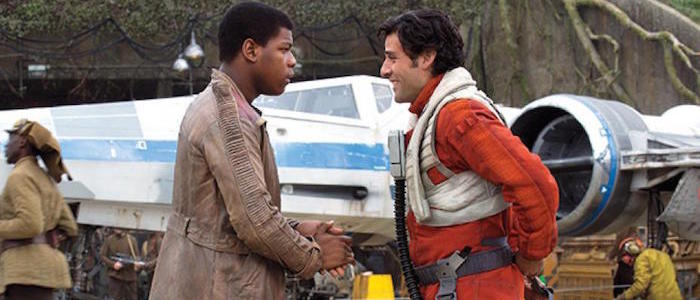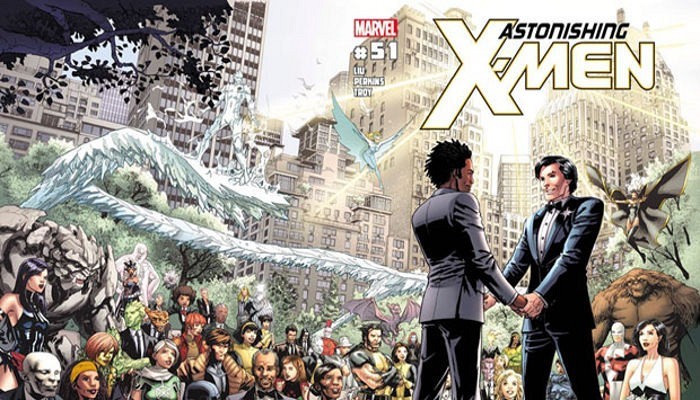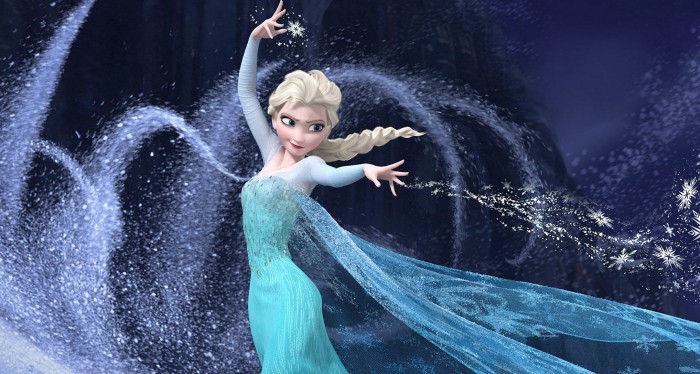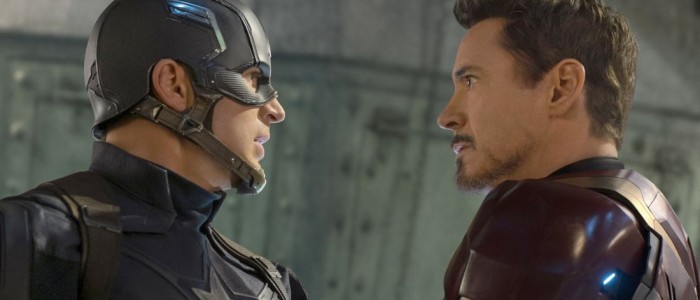Fans Want Elsa To Get A Girlfriend In 'Frozen 2'; Marvel Directors Discuss "Strong Chance" Of An LGBT Character
Disney's heavy-hitting franchises are slowly getting more diverse. The Force Awakens has more female and non-white characters in speaking roles than the first three Star Wars movies combined. Captain America: Civil War introduces a new black superhero this weekend (and he's getting his own movie in 2018). This fall's Moana introduces Disney's first Polynesian princess. And so on. But even as these universes gradually open up to women and people of color, they've continued to leave LGBT people out in the cold. And fans and filmmakers alike would like to see that change.
Recently, GLAAD called upon the studio to include LGBT characters in the Star Wars universe. Now the Frozen faithful are campaigning on social media to "#GiveElsaAGirlfriend" in the sequel, while Civil War directors Anthony and Joe Russo field questions about when the Marvel Cinematic Universe will get its first major gay character.
Disney Had Zero LGBT Characters in 2015
This week, GLAAD issued its annual report of LGBT representation in mainstream cinema, looking at the highest-grossing films of 2015 from the seven major studios (Fox, Lionsgate, Paramount, Sony, Universal, Disney, and Warner Bros.). Their analysis found that out of eleven films released by Disney last year, exactly zero featured LGBT characters. While presenting their conclusions, the organization urged the studio to include LGBT characters in the Star Wars universe:
As sci-fi projects have the special opportunity to create unique worlds whose advanced societies can serve as a commentary on our own, the most obvious place where Disney could include LGBT characters is in the upcoming eighth 'Star Wars' film. 2015's The Force Awakens has introduced a new and diverse central trio, which allows the creators opportunity to tell fresh stories as they develop their backstory. Recent official novels in the franchise featured lesbian and gay characters that could also be easily written into the stories.
For what it's worth, J.J. Abrams has said "of course" there will be gay characters going forward; Mark Hamill is perfectly fine with the idea of Luke Skywalker being gay; and John Boyega and Oscar Isaac seem totally down for a Finn / Poe romance. But we'll have to wait until Rogue One this winter and Episode VIII next year to see if all this positivity translates into actual LGBT characters onscreen. In the meantime, Disney fans are also putting the pressure on Marvel and Disney Animation to do better with LGBT issues.
When Will We See a Marvel LGBT Character?
During a recent press day for Captain America: Civil War, Collider had the chance to ask the Russos if and when the MCU movies will get their first gay character. While the MCU shows have had a few gay characters, like Jessica Jones' Jeri Hogarth and Agents of S.H.I.E.L.D.'s Joey Gutierrez, the movies have not. Here's how Joe Russo responded to the question:
I think the chances are strong. I mean, it's incumbent upon us as storytellers who are making mass-appeal movies to make mass-appeal movies, and to diversify as much as possible. It's sad in the way that Hollywood lags behind other industries so significantly, one because you think that it would be a progressive industry, and two it's such a visible industry. So I think it's important that on all fronts we keep pushing for diversification because then the storytelling becomes more interesting, more rich, and more truthful.
Indeed, Anthony Russo added, Marvel's massive success should make it easier for them to bring in LGBT characters:
I think this is a philosophy of Marvel, in success it becomes easier to take risks. There's a lot of unconventional ideas in Civil War in terms of what people's expectations of a superhero movie are, but I think we were able to do that because Winter Soldier worked and Marvel's been working in general, so there's more of a boldness in terms of what you can try and where you can go. So I think that's very hopeful for all of us moving forward that bolder and bolder choices can be made.
The directors' comments echo the ones Kevin Feige made when our own Peter Sciretta posed a similar question last year:
The answer is, there is no reason why that can't happen any time soon. You know, we pull the characters from the comics, for the most part, and they've been forging new ground for decades in the comics. They've been very progressive in the comics. And even more recently in a very important and progressive way. And we keep track of all of those things and are inspired by all of those things, so I'd love it to find an organic, meaningful and natural way for that to happen at some point in the not so distant future.
All of this talk is very encouraging, especially since they're coming from people who actually have the power to make these decisions. But it's easy to say all the right things; hopefully these filmmakers won't stop at idle chatter. If Marvel is really serious about bringing LGBT characters to the forefront in the near future, they'll have plenty of chances coming up — following Civil War, they've got about 12 more films coming up in the next five years.
Frozen Fans Want Disney to Give Elsa a Girlfriend
Meanwhile, Marvel's sister franchise Disney Animation is getting petitioned by fans who want Frozen's Elsa to get a girlfriend in the sequel. Alexis Isabel Moncada got the ball rolling on Twitter a few days ago.
Others on Twitter quickly joined in.
#GiveElsaAGirlfriend because 1 in 5 kids are queer, but only 1 in 10 feel safe enough to come out.
— mimi ♡ (@mimiIlion) May 1, 2016
The Frozen team sounds well aware of the power they have to influence young minds. Co-director Chris Buck said as much last year, shortly after the sequel was officially announced:
We have two very strong female leads in Frozen. We will keep that going in the next one. We will tackle other issues that, I think, are out there today that boys and girls, men and women, are dealing with.
I think we're very aware of what is happening in society. I don't think any of us take [them] lightly, even though they can be very funny and entertaining, the messages that our movies have and the influence they can have on young people. When the kids [watch] them, they watch them over and over again, and if we don't have a decent message in there, I think we've missed an opportunity.
Buck is being understandably vague about exactly what kinds of "issues" and "messages" Frozen 2 will tackle, but it'd be great if the future of Arendelle involved canon LGBT characters. A lot of fans (and some detractors) have already read gay subtext into the movie. Elsa's signature song "Let It Go" plays like a coming-out anthem, and the minor character Oaken (the trading shop proprietor) may or may not have a husband. A sequel seems like a golden opportunity for Disney Animation to double down on its themes of love and self-acceptance by featuring actual LGBT characters — though of course we wouldn't mind if Moana or Gigantic beat Frozen 2 to the punch.
Disney Should Take the Lead on LGBT Inclusion
To be sure, Disney's not the only studio with this glaring blind spot, and their movies aren't the only ones mysteriously devoid of LGBT characters. Of the seven studios analyzed by GLAAD, four got "Adequate" ratings and three (including Disney) got "Failing" grades. None were rated "Good" or "Excellent." Nor is Disney the only studio that decided not to feature any gay characters at all in 2015 — none of Paramount's 12 films did either.
Not that we really needed these numbers to tell us this story. Warner Bros.' DC Extended Universe and Sony's last two Spider-Man reboots haven't been much better than Disney's MCU about highlighting LGBT characters. 20th Century Fox's X-Men franchise has lots of intentional gay subtext but no obviously gay characters; Deadpool might be pansexual offscreen but came across as totally heterosexual onscreen. Universal's Fast and Furious leads come from all over the ethnic rainbow but are, as far as we can tell, all stubbornly straight and cisgender. Ditto Paramount's Star Trek and Mission: Impossible series. And so on.
But as the studio behind some of the biggest franchises in Hollywood (Marvel, Star Wars, Pixar, Disney Animation, all those live-action fairy tales, etc.) Disney is naturally going to attract a lot of scrutiny. Which puts them in a position to lead the industry into a more inclusive era, if they choose to do so.
As the quotes above indicate, the people running their flagship franchises know how to talk a good pro-LGBT game. The fans are loudly clamoring for more LGBT heroes. And the larger Disney corporation has a pattern of supporting LGBT rights. Just recently, for example, the studio threatened to boycott the state of Georgia over an anti-gay bill. Now what's left is for this studio to take the next step, and actually start including LGBT characters in their stories.




